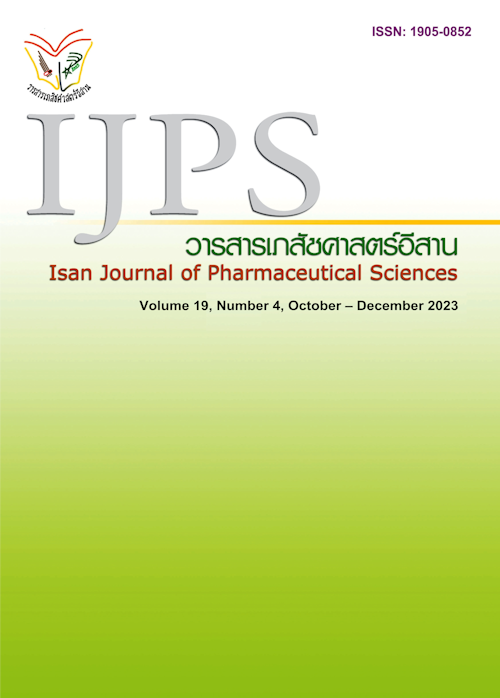Sleep Quality and Quality of Life from Cannabis Oil (Dejas Formula) Among Insomnia Patients at Thai Traditional Medical Cannabis Clinic, Phanat Nikhom Hospital, Chonburi Province
Main Article Content
Abstract
This research aims to assess the effectiveness of using Cannabis oil (Dejas formula) on sleep quality and quality of life among insomnia patients. Method: This study was a randomized controlled trial. The samples consisted of both male and female patients with insomnia who received treatment at the Thai traditional medical cannabis clinic, Phanat Nikhom hospital, Chonburi province, during October 2022 to January 2023. They were totaling 70 individuals divided into two equal groups. The experimental group received Cannabis oil (Dejas’s formula) in combination with sleep hygiene practices. The control group received placebo along with sleep hygiene practices. The quality of sleep was assessed by using the Thai version of the Pittsburgh sleep quality index. The quality of life was evaluated by using the SF-12 version 2 and the Thai version of the ESAS questionnaire. Data analysis included frequency, mean, standard deviation, t-test, and a multivariate analysis of variance (MANOVA). Results: The average sleep quality score in the experimental group after the experiment (4.87±1.57) was significantly better than before the experiment (10.48±3.42) (p < .01). The average sleep quality score after the experiment in the experimental group (4.87±1.57) was significantly better than the control group (10.15±3.68) (p < .01). The average quality of life scores within the experimental group, as assessed using the SF-12 version 2 and the Thai version of ESAS, were better after the experiment (4.18±0.32, 0.91±0.78, respectively) compared to before the experiment (3.37±0.50, 2.44±1.38, respectively), with statistical significance (p < .01 and p < .01, respectively). In addition, the average overall quality of life scores after the experiment, in the experimental group (4.18±0.32, 0.91±0.78, respectively), were significantly better than those in the control group (3.35±0.41, 2.52±0.81, respectively) (p < .01). There were 5 cases of side effects (16.13%), including constipation in 3 cases and dry throat in 2 cases. Conclusion: The research findings provide substantial empirical evidence confirming the effectiveness of Cannabis oil (Dejas formula) in improving the quality of sleep and quality of life for insomnia patients.
Article Details

This work is licensed under a Creative Commons Attribution-NonCommercial-NoDerivatives 4.0 International License.
In the case that some parts are used by others The author must Confirm that obtaining permission to use some of the original authors. And must attach evidence That the permission has been included
References
Arunpongpaisal S, Anekwit N. Cannabis extract using in mental health patients. J DMS. 2019 Jan-Feb; 44(1): 7-9.
Assawamakin A. Policies and directions for medical cannabis use [Online]. 2019 Sep 14 [cited 2020 Oct 28]; [1 screen]. Available from: https://www.hfocus.org/content/2019/09/17729
Aunjitsakul W, Udomratn P. Cognitive Behavioral Therapy for Insomnia (CBT-I). J Psychiatr Assoc Thailand. 2016 Jan-Mar; 61(1): 89-106.
Chinvararak C, Kirdchok P. Insomnia, problems that should never be ignore. Voc Edu Cent Reg J. 2020 Jun 25; 4(1): 1-10.
Crippa JA, Zuardi AW, Martin-Santos R, Bhattacharyya S, Atakan Z, McGuire P, et al. Cannabis and anxiety: a critical review of the evidence. Hum. Psychopharmacol Clin Exp. 2009 Aug 19; 24(7): 515-523.
Department of Mental Health. Insomnia related to circadian rhythm can be solved without medication [Online]. 2020 Dec 13 [cited 2020 Oct 28]; [1 screen]. Available from: https://dmh.go.th/news-dmh/view.asp?id=30519
Department of Thai Traditional and Alternative Medicine. Guidelines for the use of cannabis oil in Thai traditional medical cannabis clinic. Nonthaburi: Department of Thai Traditional and Alternative Medicine; 2020
Feingold D, Weiser M, Rehm J, Lev-Ran S. The association between cannabis use and anxiety disorders: Results from a population-based representative sample. Eur Neuropsychopharmacol. 2016 Mar; 26(3): 493-505.
Health Administration Division. The number of patient receiving medical drugs/Thai traditional drug formulations [Online]. 2020 [cited 2020 Oct 28]; [5 screen]. Available from: http://ccd.moph.go.th/report/web/site/index
Mata C. Prevalence of Poor Sleep Quality and Association between Sleep Quality and Musculoskeletal Disorder Symptoms among Maintenance Workers. J DMS. 2017 Jul-Aug; 42(4): 70-75.
Na Wichian S. Sleep Quality of Older People in the Community. JTNMC. 2021 Oct 12; 36(2): 18-31.
Ohayon MM, Reynolds III CF. Epidemiological and clinical relevance of insomnia diagnosis algorithms according to the DSM-IV and the International Classification of Sleep Disorders (ICSD). Sleep Med. 2009 Oct; 10(9): 952-960.
Pholsiripathom S, Triprateepsilp N. Surprising reasons to get more sleep [Online]. 2023 [cited 2023 Sep 21]; [1 screen]. Available from: https://www.gj.mahidol.ac.th/main/knowledge-2/surprising-reasons-to-get-more-sleep/
Ried K, Tamanna T, Matthews S, Sali A. Medicinal cannabis improves sleep in adults with insomnia: a randomised double-blind placebo-controlled crossover study. J Sleep Res. 2022 Nov 10; 32: 1-12.
Silarak K. Efficacy of Cannabis Oil (Deja’s Formula) on Out-Patients’ Sleep Quality and Quality of Life at Hang Ga Rok Clinic : Phra Arjarn Phan Arjaro Hospital, Sakhon Nakhon Province. J Reg Health Prom Cent 9. 2022 Nov 27; 16(3): 1097-1108.
Sitasuwan T, Bussaratid S, Ruttanaumpawan P, Chotinaiwattarakul W. Reliability and validity of the Thai version of the Pittsburgh Sleep Quality Index. J Med Assoc Thai. 2014; 97(Suppl.3): S57-67.
Tengtermwong N, Effectiveness and safety of Suk Sai-Yad herbal remedy for chronic insomnia: a preliminary retrospective study in Chao Phya Abhaibhubejhr hospital. J Thai Trad Alt Med. 2021 May-Aug; 19(2): 331-343.
Tipratchadaporn S, Srita J, Pomchaiya P, Boonyawan S, Silarak K. Benefit and Safety of Suk Sai-Yad Traditional Medicine Recipe in Patients with Insomnia. J Thai Trad Alt Med. 2021 May-Aug; 19(2): 317-330.


